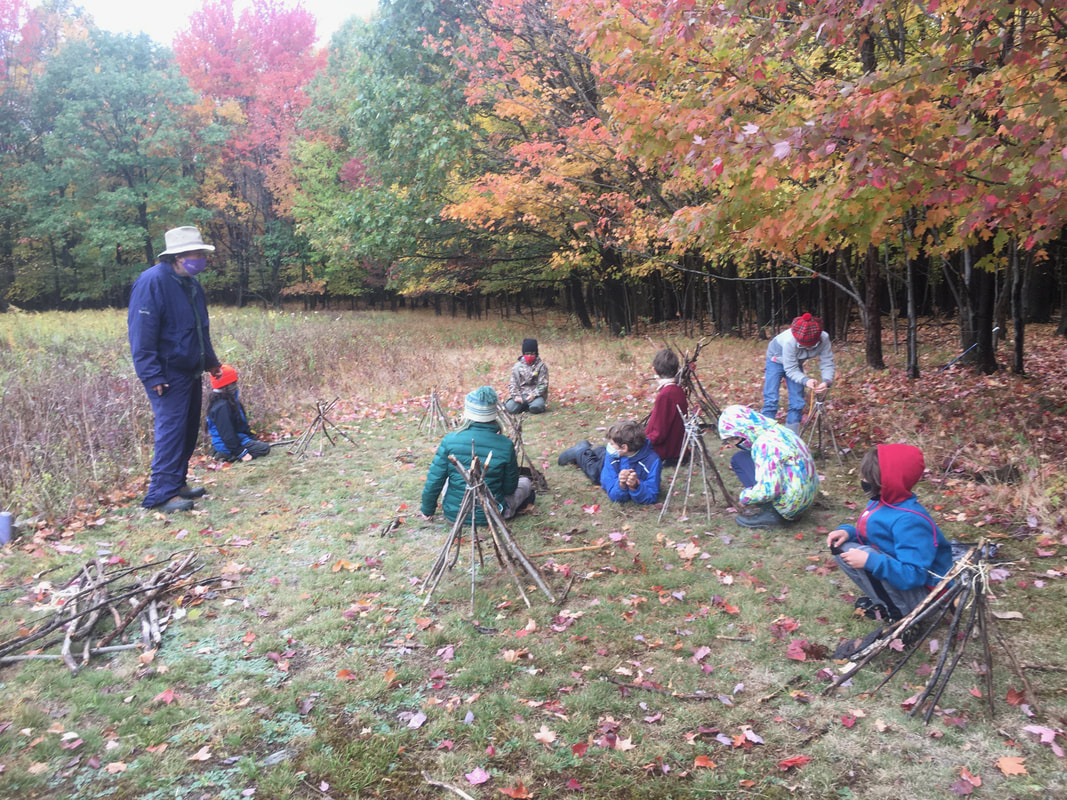|
Each morning the children carry the heavy plastic jugs they have filled with water through grassy paths and leaf littered woods to the classroom. Their shoes and boots are spattered with dirt and mud, badges of their toughness. Along the path, they gather sticks and dried vegetation for kindling to start the day’s fire. Once it catches, a metal grate is placed across to hold the pot to heat up the water for washing or tea. They wash their hands from a clay urn (after all it is Covid) in preparation for this exciting phone call.
From under the makeshift tent, the children gather to meet their friends on the other side of the world. The cellular service is spotty though, and it takes several attempts and changing positions to connect. We eagerly pass the phone to show ourselves and our unusual outdoor classroom to our friend, thousands of miles away in…Kibera, Kenya. For several years now we have involved our students here in Ithaca, NY, with the Crossing Thresholds’ sponsorship program. My husband and I have a small home schooling “school”, The Finnstitute, which offers children ages 8-12, academically enriching and creative curricula three days a week. This year Covid had us getting creative; we decided for the fall to move our classroom outside to our land in rural Danby. For our children, this rustic classroom was a welcome experience, as these are kids who come from homes with alternative lifestyles and appreciation for the outdoors. “Finnstitute in the Fields'' looked very different in many ways than previous years, however our connection with our Kibera students would not be broken. In preparation for this call, we explore our large map of Africa, finding Nairobi. We have been studying maps in all forms, geographic, topographic, political, geologic etc., so it is not only a way to “place” where in the world our friends are, but also to extend our geography lessons. We meet Derric in his home with his mother, as it is after school hours. We have been studying shelters, through history and across cultures so it is a rare opportunity for us to have a “window” into Derric’s life in their simple, small, sparse dwelling in Kibera. We have discussed in the context of our shelter studies, the material and monetary resources that impact shelter. Now we witness this reality in a very personal way. Usually we “visit” from their school to our classroom in downtown Ithaca. We note interestingly, that both are constructed from cinder blocks. The commonalities of life experiences are limited though. Through our years of connection with CT, we collect supplies, make cards and decorate pencil boxes, all while exploring with our students the circumstances, conditions and challenges of life for the children in Kibera. We discuss that even though their parents choose to homeschool them, that they are privileged to live in the United States where EVERY child has the right to a free education in contrast to Kenya. Our children are enjoying their rustic classroom in the fields and woods, but at the end of the day, they go home to their warm, comfortable houses, built structurally safe and solid from the elements. They enjoy home cooked meals made from plentiful organically grown vegetables from their CSA or home garden. They know whenever they are hungry, they can freely open their large, ever humming refrigerator or well stocked kitchen cabinet to find all sorts of nutritious fare. They know that after a day in the woods, they can get in a hot bath and wash away the day’s dirt and shampoo the smokey scent from their hair, from eating and heating around the fire. They can anticipate curling into their cozy and comfy beds, while perhaps being read a bedtime story. They can drift off to sleep with not a worry or care for their physical safety, their next meal, their today or their tomorrow. Through the years, we have shared much more than school supplies and stickers. We have sung many songs and recited plenty of poems; we have shown our different Kibera friends through our classroom window, the white snow falling and the Canada geese that live on the inlet that runs to our Cayuga Lake. We have learned simple Swahili phrases for and from our Kibera friends. We have asked many questions and we have answered many of theirs. By giving our children a window into the lives of their Kibera peers, they have been given a mirror to their own. It awakens an appreciation for all that they may take for granted and stir a compassion and caring they may carry with them throughout their lives. We can only hope that for our Kibera friends, the window into our children’s lives has as lasting and meaningful an impact. Helene Finn
0 Comments
|
Archives
May 2024
|


 RSS Feed
RSS Feed
